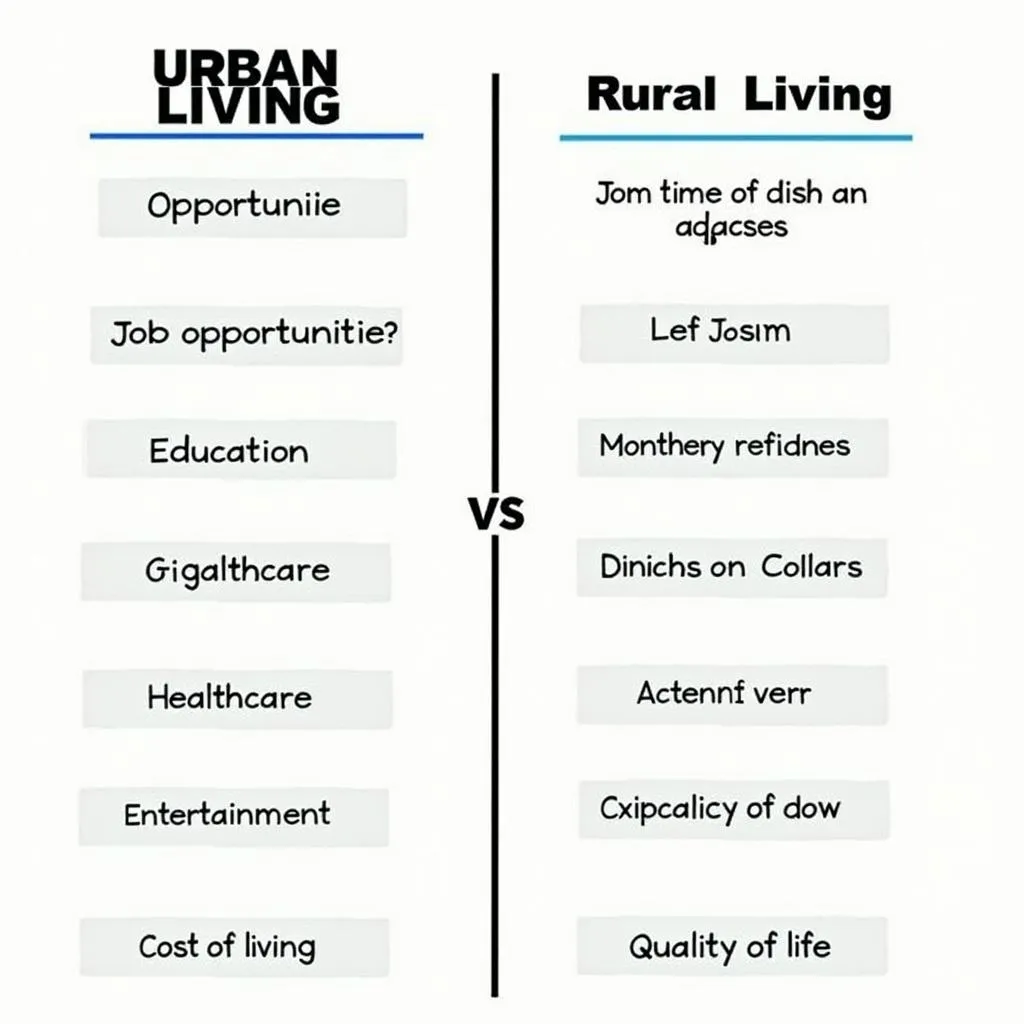The topic of advantages and disadvantages of living in urban areas is a common theme in IELTS Writing Task 2. Based on analysis of past exams and current trends, this subject has appeared frequently and is likely to continue being a popular choice for test makers. Let’s examine a relevant question that has been seen in recent IELTS exams:
Some people think that living in big cities brings more benefits, while others believe that living in small towns or rural areas is better. Discuss both views and give your own opinion.
This question directly addresses the advantages and disadvantages of urban living compared to smaller towns or rural areas. Let’s analyze the question and provide sample essays for different band scores.
Question Analysis
This question requires you to:
- Discuss the benefits of living in big cities
- Discuss the advantages of living in small towns or rural areas
- Present your own opinion on which is better
Remember to address all parts of the question and provide a balanced discussion before stating your personal view.
Sample Essay for Band 8
Living in large metropolitan areas versus small towns or countryside has been a topic of debate for many years. While some argue that big cities offer more opportunities and amenities, others contend that smaller communities provide a better quality of life. In my opinion, both environments have their merits, but I believe that urban areas generally offer more advantages for most people.
Proponents of city life often cite the abundance of job opportunities and career advancement possibilities as major benefits. Large cities typically have diverse economies with numerous industries, allowing individuals to find work in their chosen fields or explore new career paths. Additionally, urban areas usually boast better educational institutions, from prestigious universities to specialized training centers, providing residents with ample opportunities for personal and professional growth.
Furthermore, cities offer a wide range of cultural and entertainment options that are often unavailable in smaller towns. Museums, theaters, concert venues, and sports stadiums are common features of urban landscapes, catering to various interests and preferences. The diversity of restaurants, cafes, and shops also contributes to a vibrant and exciting lifestyle that many find appealing.
On the other hand, advocates for small town or rural living argue that these areas provide a higher quality of life in terms of peace, safety, and community bonds. Smaller communities often have lower crime rates, less pollution, and a stronger sense of neighborliness. The slower pace of life and proximity to nature can also lead to reduced stress levels and improved overall well-being.
Moreover, the cost of living in rural areas is generally lower than in big cities, allowing residents to enjoy larger homes and more spacious surroundings. This can be particularly attractive for families seeking a safe and nurturing environment for their children.
In my view, while both urban and rural areas have their advantages, I believe that big cities offer more benefits for the majority of people. The diverse opportunities for career growth, education, and personal development, coupled with the rich cultural experiences available in urban settings, outweigh the drawbacks of city life such as higher costs and increased stress. However, I acknowledge that personal preferences and individual circumstances play a significant role in determining the ideal living environment for each person.
In conclusion, the choice between urban and rural living depends on individual priorities and lifestyle preferences. While small towns and rural areas offer tranquility and a strong sense of community, I believe that the numerous advantages of big city life, including career opportunities, educational options, and cultural diversity, make urban areas a more beneficial choice for most people in today’s interconnected world.
 Comparison chart of urban vs rural living
Comparison chart of urban vs rural living
Explanation of Band 8 Score
This essay would likely receive a Band 8 score for the following reasons:
-
Task Achievement: The essay fully addresses all parts of the task, discussing both views and clearly stating a personal opinion.
-
Coherence and Cohesion: The ideas are logically organized with clear progression throughout the essay. Paragraphs are well-linked, and cohesive devices are used effectively.
-
Lexical Resource: The essay demonstrates a wide range of vocabulary used accurately and appropriately. For example, “abundance,” “proponents,” “vibrant,” and “nurturing” are used contextually.
-
Grammatical Range and Accuracy: A variety of complex structures are used accurately, with only minor errors. The essay shows good control of grammar and punctuation.
-
Development of Ideas: Each main point is well-developed with relevant examples and explanations, showing depth of analysis.
Sample Essay for Band 6-7
Some people think that living in big cities is better, while others prefer small towns or rural areas. Both options have their own advantages and disadvantages, and in this essay, I will discuss both views and give my opinion.
Living in big cities has many benefits. First, there are more job opportunities in cities. Many companies have their offices in urban areas, so it’s easier to find work. Second, cities have better facilities like hospitals, schools, and universities. This means people can get good healthcare and education. Also, cities offer more entertainment options such as cinemas, theaters, and shopping malls.
However, life in big cities also has some drawbacks. The cost of living is usually higher in cities. Rent, food, and transportation can be expensive. Cities are also often crowded and noisy, which can be stressful for some people. Additionally, urban areas may have higher levels of pollution, which can affect people’s health.
On the other hand, small towns and rural areas have their own advantages. The cost of living is generally lower in these places. People can often afford bigger houses with gardens. The environment is usually cleaner and quieter, which can be good for health and relaxation. Rural areas also tend to have a stronger sense of community, where people know their neighbors and help each other.
But there are also disadvantages to living in small towns or rural areas. There may be fewer job opportunities, especially for specialized careers. The quality of healthcare and education might not be as high as in cities. Also, there are usually fewer options for entertainment and shopping.
In my opinion, I think living in big cities is generally better for most people. While it’s true that cities can be expensive and stressful, the advantages of more job opportunities, better facilities, and diverse cultural experiences outweigh the disadvantages. However, I believe that the best choice depends on a person’s individual needs and preferences.
In conclusion, both big cities and small towns have their pros and cons. Cities offer more opportunities and facilities, but can be expensive and stressful. Small towns are quieter and cheaper, but may have fewer job options and amenities. Ultimately, the best choice depends on what each person values most in their lifestyle.
 Illustration of urban lifestyle advantages
Illustration of urban lifestyle advantages
Explanation of Band 6-7 Score
This essay would likely receive a Band 6-7 score for the following reasons:
-
Task Achievement: The essay addresses all parts of the task, discussing both views and providing a personal opinion. However, the ideas could be more fully developed.
-
Coherence and Cohesion: The essay is generally well-organized, with clear paragraphing. Some cohesive devices are used, but they could be more varied.
-
Lexical Resource: There is a sufficient range of vocabulary, with some less common words used appropriately (e.g., “drawbacks,” “specialized”). However, there is some repetition and lack of sophistication in word choice.
-
Grammatical Range and Accuracy: The essay uses a mix of simple and complex sentence structures with generally good control. There are some errors, but they do not impede communication.
-
Development of Ideas: Main ideas are present and supported, but the development could be more thorough and sophisticated.
Key Vocabulary to Remember
-
Urban (adjective) /ˈɜːrbən/ – relating to a city or town
-
Rural (adjective) /ˈrʊərəl/ – relating to the countryside
-
Metropolis (noun) /məˈtrɒpəlɪs/ – a very large city, often the most important city in a region
-
Infrastructure (noun) /ˈɪnfrəstrʌktʃər/ – the basic physical and organizational structures needed for the operation of a society or enterprise
-
Amenities (noun) /əˈmiːnətiz/ – useful or pleasant facilities or services
-
Congestion (noun) /kənˈdʒestʃən/ – the state of being overcrowded, especially with traffic
-
Diversity (noun) /daɪˈvɜːrsəti/ – the state of being varied; variety
-
Cost of living (noun phrase) /kɒst əv ˈlɪvɪŋ/ – the amount of money needed to sustain a certain standard of living
-
Quality of life (noun phrase) /ˈkwɒləti əv laɪf/ – the standard of health, comfort, and happiness experienced by an individual or group
-
Gentrification (noun) /ˌdʒentrɪfɪˈkeɪʃn/ – the process of renovating and improving a house or district so that it conforms to middle-class taste
In conclusion, the topic of advantages and disadvantages of living in urban areas is a common and important one in IELTS Writing Task 2. By understanding the key elements of a high-scoring essay and practicing with different perspectives, you can improve your ability to address this topic effectively. Remember to always analyze the question carefully, provide a balanced discussion, and support your points with relevant examples and explanations.
For further practice, consider writing essays on related topics such as:
- The challenges of rapid urbanization in developing countries
- The pros and cons of offering free public transportation in cities
- The impact of smart homes on urban living
- The debate over implementing car-free zones in city centers
We encourage you to write your own essay on the topic provided in this article and share it in the comments section below. This practice will help you refine your writing skills and receive feedback from others preparing for the IELTS exam.


